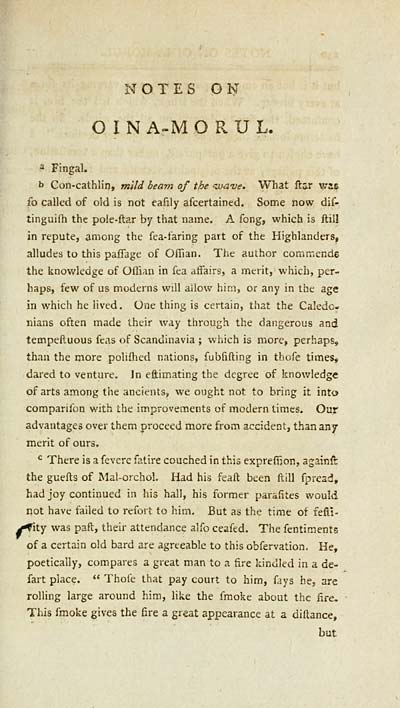Download files
Complete book:
Individual page:
Thumbnail gallery: Grid view | List view

NOTES ON
O I N A-M O R U L.
^ Fingal.
b Con-cathlin, mild beam of the -wave. What ftar w«
fo called of old is not eafily afcertained. Some now dif-
tinguifh the pole-ftar by that name. A fong, which is ftill
in repute, among the fea-t'aring part of the Highlanders,
alludes to this paflage of Oflian. The author commends
the knowledge of Oflian in fea affairs, a merit, which, per-
haps, few of us moderns will allow him, or any in the age
in which he lived. One thing is certain, that the Caledc
nians often made their way through the dangerous and
tempeftuous fcas of Scandinavia ; which is more, perhaps,
than the more polifhed nations, fubfifting in thofe times,
dared to venture. Jn eftimating the degree of knowledge
of arts among the ancients, we ought not to bring it into
companion with the improvements of modern times. Our
advantages over them proceed more from accident, than an/
merit of ours.
*^ There is a fevere fatire couched in this exprefijon, againft
the guefts of Mal-orchol. Had his feaft been ftill fprcad,
had joy continued in his hall, his former parafites would
not have failed to refort to him. But as the time of fefii-
^ity was paft, their attendance alfo ceafed. The fentiraents
of a certain old bard are agreeable to this obfervation. He,
poetically, compares a great man to a fire kindled in a de-
fart place. " Thofe that pay court to him, fays he, are
rolling large around him, like the fmoke about the fire.
This fmoke gives the fire a great appearance at a diftance,
but
O I N A-M O R U L.
^ Fingal.
b Con-cathlin, mild beam of the -wave. What ftar w«
fo called of old is not eafily afcertained. Some now dif-
tinguifh the pole-ftar by that name. A fong, which is ftill
in repute, among the fea-t'aring part of the Highlanders,
alludes to this paflage of Oflian. The author commends
the knowledge of Oflian in fea affairs, a merit, which, per-
haps, few of us moderns will allow him, or any in the age
in which he lived. One thing is certain, that the Caledc
nians often made their way through the dangerous and
tempeftuous fcas of Scandinavia ; which is more, perhaps,
than the more polifhed nations, fubfifting in thofe times,
dared to venture. Jn eftimating the degree of knowledge
of arts among the ancients, we ought not to bring it into
companion with the improvements of modern times. Our
advantages over them proceed more from accident, than an/
merit of ours.
*^ There is a fevere fatire couched in this exprefijon, againft
the guefts of Mal-orchol. Had his feaft been ftill fprcad,
had joy continued in his hall, his former parafites would
not have failed to refort to him. But as the time of fefii-
^ity was paft, their attendance alfo ceafed. The fentiraents
of a certain old bard are agreeable to this obfervation. He,
poetically, compares a great man to a fire kindled in a de-
fart place. " Thofe that pay court to him, fays he, are
rolling large around him, like the fmoke about the fire.
This fmoke gives the fire a great appearance at a diftance,
but
Set display mode to: Large image | Transcription
Images and transcriptions on this page, including medium image downloads, may be used under the Creative Commons Attribution 4.0 International Licence unless otherwise stated. ![]()
| Early Gaelic Book Collections > Ossian Collection > Morison's edition of the Poems of Ossian, the son of Fingal > (605) |
|---|
| Permanent URL | https://digital.nls.uk/77723007 |
|---|
| Description | Selected books from the Ossian Collection of 327 volumes, originally assembled by J. Norman Methven of Perth. Different editions and translations of James MacPherson's epic poem 'Ossian', some with a map of the 'Kingdom of Connor'. Also secondary material relating to Ossianic poetry and the Ossian controversy. |
|---|
| Description | Selected items from five 'Special and Named Printed Collections'. Includes books in Gaelic and other Celtic languages, works about the Gaels, their languages, literature, culture and history. |
|---|

